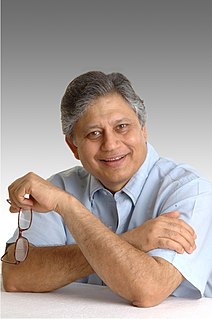A Quote by Suzanne Bates
As we started working with leaders, providing them with assessment feedback, noticing the impact it was having on them, and their teams, a real story unfolded, and the book All the Leader You Can Be became what it is now - a guide to leaders who want to understand their strengths, and also appreciate how to enhance their leadership.
Related Quotes
Agile leaders encourage their teams to adjust and experiment constantly. In today's age of oversharing, the best leaders also have to be more open and accessible. To be effective, you also have to be aware of how others perceive you and cop to your flaws every now and then. One of the lesson to successful leadership may be quite challenging but very important. Expose yourself. Allow yourself to be vulnerable - less super and more human. These "Leadership 3.0" practices, as I call them, are critical to being an effective manager when you're getting started in today's world.
If we want leaders to make good decisions amid huge complexity, and learn how to build great teams, then we should send them to learn from people who've proved they can do it. Instead of long summer holidays, embed aspirant leaders with Larry Page or James Dyson so they can experience successful leadership.
Not many of us will be leaders; and even those who are leaders must also be followers much of the time. This is the crucial role. Followers judge leaders. Only if the leaders pass that test do they have any impact. The potential followers, if their judgment is poor, have judged themselves. If the leader takes his or her followers to the goal, to great achievements, it is because the followers were capable of that kind of response.
Leaders cannot work in a vacuum. They may take on larger, seemingly more important roles in an organization, but this does not exclude them from asking for and using feedback. In fact, a leader arguably needs feedback more so than anyone else. It's what helps a leader respond appropriately to events in pursuit of successful outcomes.
We become overly reliant on the strengths that got us where we are today. We also become isolated as we move up in the organization. Unless we have the benefit of assessment, and unless we invite feedback on our leadership, we continue to lean on strengths that can actually work against us, and fail to expand our leadership style in a way that makes us more effective.
When you coach and teach leadership, most people think about them. It's like you're the leader and how do you influence them. Clearly, leaders do take their followers, their flock, their enterprise, their business - whatever - hopefully to a better place. But I think the foundation of what makes really great leaders is they lead themselves, and they're conscious about knowing themselves and coaching and leading themselves in a very profound way. The simplest of us talk to ourselves. The question is, "Do we really lead ourselves?"
Micromanaging erodes people's confidence, making them overly dependennt on their leaders. Well-meaning leaders inadvertently sabotage their teams by rushing to the rescue and offering too much help. A leader needs to balance assistance with wu wei, backing off long enough to let people learn from their mistakes and develop competence.
Level 5 leaders are differentiated from other levels of leaders in that they have a wonderful blend of personal humility combined with extraordinary professional will. Understand that they are very ambitious; but their ambition, first and foremost, is for the company's success. They realize that the most important step they must make to become a Level 5 leader is to subjugate their ego to the company's performance. When asked for interviews, these leaders will agree only if it's about the company and not about them.
The unwillingness of most leaders to set standards, to administer feedback when standards are not met, to praise clearly when standards are met, stands in the way of the development of excellence. The leader who makes no demands of his disciples cannot really lead them at all. The sense of new excitement and new challenge generated by the gospel will be blunted by leaders who shield followers from the full demands of fellowship.































